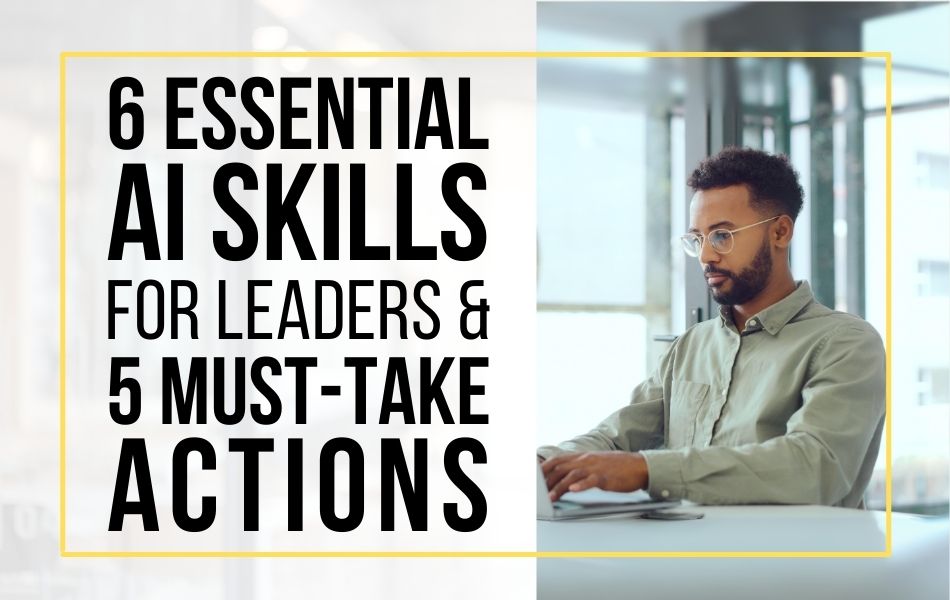
198. 6 Essential AI Skills for Leaders & 5 Must-Take Actions
About this Podcast
Ep. 198 – Have you wondered what other leaders are currently doing on the topic of AI?
Even if your workplace as a whole isn’t a frontrunner in the space, it’s vital for you, as a leader, to equip yourself with the necessary skills early on and begin embracing and even leading these conversations.
In this week’s episode of The Manager Track podcast, Ramona delves into the impactful convergence of leadership and AI. She highlights the essential AI skills leaders must cultivate and the actionable steps they should initiate right now to keep up with the changes we’ve seen so far and anticipate in the near future.
A quick quote from the conversation: “The ability to regularly build in strategic thinking and to do this well is one of those deciding factors on who, which leaders, which teams will win, and which ones will be left behind or will struggle through it all.”
— SURVEY LINK —
Fill out our 1-question survey on AI Leadership here.
I will send you our GenAI Quick-Start Guide for Leaders as a thank you!
Episode 198 Transcript:
Ramona Shaw [00:00:00]:
This is episode 198, and we’re gonna talk about 6 essential AI skills for leaders and 5 must take actions. I’m excited to dive in. Here’s the question. How do you successfully transition into your 1st official leadership role, build the confidence and competence to lead your team successfully, And establish yourself as a respected and trusted leader across the organization. That’s the question, and this show provides the answers. Welcome to The Manager Track podcast. I’m your host, Ramona Shaw, and I’m on a mission to create workplaces where work is not seen as a source of stress and dread, but as a source of contribution, Action and fulfillment. And this transition starts with developing a new generation of leaders who know how to lead so everyone wins and grows.
Ramona Shaw [00:00:45]:
In the show, you’ll learn how to think, communicate, and ask as the confident and confident leader you know you can be. Welcome to The Manager Track podcast. This is one of those sprinkled in podcast episodes that I’m gonna do at least for the year of 2024 on the topic of AI And especially how leaders in their leadership need to adapt to the introduction of generative artificial intelligence In the workplace. Today, specifically, I want to elaborate on 6 very specific skills related to AI that you as a leader invest Time and resources in developing. And then we’re going to talk about a few specific actions or action items of what I suggest at this point. So this is now Going to be released in February of 2024. What by February 2024, every leader who’s responsible for other people so if you’re a team lead, a people leader, These are the checkpoints that would be on my important must do lists for February 2024. I’m gonna share that video.
Ramona Shaw [00:01:47]:
Okay. Let’s dive in with our 1st topic on these essential skills. And I recently talked about them in a Online session in a free online training called AI for leaders. And this is one of those points from that session that I feel would be relevant for anyone listening to the Manager Track podcast. I’m going to dive right in. We’re going to start off with the most basic and, very much, to no one’s surprise, AI fundamentals. You need to not just know what is AI, what is machine learnings, what are LLMs, what has been the evolution of artificial intelligence Over the last 20 years or so. And what are the projections into the future? But you also need to be able to Communicate in a succinct and sophisticated way about AI to your stakeholders and to your team members.
Ramona Shaw [00:02:37]:
You need to be able to make informed decisions using AI tools or algorithms that are available to you. And you need to be able to position Your team and yourself really well in that transformation that we’re all going to experience or are already experiencing. So all of this falls under the umbrella of knowing AI fundamentals. Skill number 1. Skill number 2 is to understand the ethical considerations and the risks that come with AI. And I don’t mean just, Oh, do some research on, like, what are the common risks or the the mistakes that may happen. Really understand the issue around racial biases, Gender biases and and any other biases that can negatively impact our decision making and our behaviors. Understand and know what you need to pay attention to To mitigate such biases in the outcome or the work that you produce and deliver when part of your workflow, the data that you’re using, has been touched by AI.
Ramona Shaw [00:03:38]:
Understand the concerns of people. The concerns of your CEO, your C suite, or your board, your stakeholders, your clients, Maybe your vendors or partners, the people on your team, what are their ethical concerns and the risks that they perceive? And then with that in mind, like understanding that through your curiosity and your ability to ask good questions. And then you need to take that Into account as you think 10 steps ahead. There are certain things that as of today, we may not need to be worried about. But this is a bit of a wild west at the moment. Be aware that if you decide on introductions of AI tools today, Or you’re starting to make decisions based on how you anticipate your industry or your profession or your market. To move towards based on AI, Then what might be the risks down the line that you need to monitor and potentially mitigate starting now? Okay. So the risk and aspect and the ethical considerations is something that means you need to expose yourself some training or gather that knowledge, become really good at asking the right questions to keep that in mind in your conversations around AI.
Ramona Shaw [00:04:52]:
That is number 2. Number 3 It’s Sharhichi thinking. And I actually love that through all this, so many of us who may be really caught up then the tactical work or a short term initiatives, And our desks might be overloaded with work. And we hardly ever are able to carve out time to think more strategically, and it may not have ever been As important. But when it comes to this technological transformation, the ability to regularly build in Strategic thinking and to do this well is one of those deciding factors on who, which leaders, which teams will win and which ones will be left behind will struggle through it all. When you’re thinking strategically, evaluate how you’re going to continue to drive value For the clients or your organization or whoever you your internal external clients are, how you’re going to improve processes, the efficiency, Or the quality of your work, the results you’re creating, how to enhance competitiveness in the market, and do all that We’re critical thinking. A lot of what we’re hearing now are about developments and trends and and where industries and technologies are going Our assumptions. We can learn from history.
Ramona Shaw [00:06:08]:
So much of what even experts say or what we may anticipate to be true in the future and apply to all these things. When they actually happen, they don’t play out exactly as we plan. So combine your strategic thinking with critical thinking as people present ideas to you Or as you evaluating opportunities or as you’re listening to ex experts or trends to always remember that your situation, your company, Your product is unique and there is no cookie cutter solution. So while there may be trends and themes, Not everything applies to all the things and all the teams. Right? So strategic thinking and critical thinking, I’m going to put those into 1 bucket. The 4th 1 is going to be change leadership. Change leadership means to be able to lead your team through these change processes. And that starts with, addressing the fears that employees have about losing their jobs or not being able to deliver value anymore or having to Be reeducated and reskilled, all of that.
Ramona Shaw [00:07:10]:
These are some real fears. In 2023, Gartner issued a report and said that About 20% of the employees surveyed said that they’re fearing losing their job. And I would bet that that number is significantly higher in 2024. And we’re already seeing this tech layoffs continue to happen. And because we’re seeing this and because it’s in the media, The fear will continue to manifest itself. In addition to the worries that people have at introducing AI is that we’re simply not wired for change, and we’ve talked about on this podcast here about that quite a few times. We’re not wired for change. There’s a lot of uncertainty.
Ramona Shaw [00:07:47]:
There’s not a lot of ambiguity built in, And we’re not quite wired that way. And the skill of change management is combining some hard skills. So how do you actually anticipate the change and the the hurdles and challenges? How do you plan that out? How do you have a communication plan? What are the specific steps to ensure buy in? It’s also a soft skill. You’re able to demonstrate empathy. You’re able to make your employees feel heard. You’re able to make them feel like they’re engaged and part of it, And you’re collaborating and communicating with them effectively. So those are all the things that fall into that skillset of change leadership. That is number 4.
Ramona Shaw [00:08:23]:
Number 5 Is your ability to develop your team, both through, appropriate hiring, not what your team needs as of today, But bearing in mind that what your team does now may not be what your team does in 6 to 12 months. So how are you filling positions now with addressing the skill sets So you will need then. So hiring a bit for into the future, being able to position yourself and your team in the organization in a way so that you’re set up To win and your team will be safe or secure and ideally continue to expand and grow. So how you position your team, and then how do you within the team or let’s say the bus, Who do you put on which seat and then who do you reskill or develop further to ensure that your team will be needed and will drive High value into the future. That is on you as a people leader to figure out and to do so ASAP. The 6th and last scale here that I want to address is project management. This is a bit more of a hard skill, but it covers how do you assess opportunities, including how do you perform an ROI analysis, How do you present such initiatives and get buy in from stakeholders and approval? Usually, to start off with a pilot project, How do you run those pilot projects and exert your influence, including influencing without authority? Because most likely you will work Across different departments or collaborate with people that you don’t have formal authority over. And in that project management skill set overall And and with introducing AI, my belief is that leaders will, in the short term, meaning, in for the next couple of years or so, be more involved in project management than they might have in the past.
Ramona Shaw [00:10:05]:
Now some of you have done project management many, many times and you feel very familiar with that. And some of you may be somewhat new to that and you haven’t gone through the process from identifying opportunities, assessing which one to pursue, to gathering the right Team members with the right strength to execute on that project and then managing the project and communicating and involving all your stakeholders, including stakeholder management and all that to achieve the results you’re going forward. So that is number 6. I’m gonna quickly recap. Number 1, AI fundamentals. Number 2, The ethical considerations and risks. Number 3, strategic thinking and critical thinking. Number 4, change management.
Ramona Shaw [00:10:44]:
Number 5, Team development. And number 6, project management. Okay. So these were the 6 skills that in my opinion are generally for most people, The key skills to further lean into and to pay attention to in 2024. Now I promised you I will also give you some must do actions Four must take actions. And the reason why I wanted to include this here is because a lot of my clients ask me so in terms of AI, what do you see other leaders do? What are some of the things you recommend I get involved in. And because I think it’s so important, I wanna share this with you here. The 5 specific actions that I suggest Every single people leader should work on is 1, clarifying what the AI policy is on the team.
Ramona Shaw [00:11:31]:
Like, What is it used for? How is it used? What are the do’s and don’ts as it relates to using AI tools and so forth in the workflow? That’s number 1. Now a few companies have this and you just want to make sure that everyone’s aware and it’s all up to date and it’s applicable to your team. Most companies don’t. And so it’s on you as a team leader to take care of that. Don’t wait for the company to present that to you. Create the policies for your team as they are applicable. Number 2, either join an AI committee in your organization or create an AI committee within your team. And even let’s say you have 6 people on your team, even if that AI committee is only 2 people.
Ramona Shaw [00:12:14]:
That still makes a committee. It makes sense to Have a few people be responsible for all things AI and those will take the lead. By the way, a great opportunity for Some ambitious person on your team who’s tech savvy and interested in the space and to lean into their leadership and to be able to drive these conversations. That can really be a boost and a sign of recognition for them. So have dedicated people who are in charge of all things AI as it relates to your team. Number 3 is to brainstorm and to do this, by the way, not as a one off. So if you’ve done this back in October 2022, Yeah. It’s too time to do this again, generally speaking.
Ramona Shaw [00:12:52]:
And now as usual, I don’t know your unique situation, but I’m speaking very generic here. Brainstorm with your team either as a whole or you can also do dive in. Individually, your team can leverage AI. So specific tasks, new opportunities, risks, workflows, all the things, like get everyone’s take and ideas On the table. So continue to involve your team and have commerce open conversations, and then create a plan as a result of that. And by the way, these brainstorming conversations will then Also have an impact on the policy that you write. And again, all this can be delegated to a person on your team or the AI committee on your team to arrange, organize, Take notes and identify action items and so forth. The 4th 1 is to have conversations with as many stakeholders as you can about Their take on how AI will impact the department, the team, the company as a whole, what they’ve done or what they’re planning on doing as it relates to AI.
Ramona Shaw [00:13:48]:
So have as many conversations as you can with others in the organization or within your industry or in your network about it. And then number 5, invest in your own training. Educate yourself and learn and fill any of the gaps that you might detect As it relates to the 6 skills we talked about earlier and beyond as it specifically applies to maybe the the tools of the technology that your company is using or that you’re thinking of introducing. Sten spend time becoming AI savvy. If you want help with all of this, we have a program called AI Fluency for Leaders. It’s a structured and hands on 5 week program that we run with leaders. We’re gonna we guide them through the entire process and we’ll cover on how to go about all these Action items that I just talked about as well. To learn more about the program, check the show notes for the link or visit arcova.org and check out our services.
Ramona Shaw [00:14:42]:
So this is fun. This is really exciting for you to embrace these for you to embrace these conversations and lean into it We’ll put you into a poll position. And the work that I do here with the podcast and that we do at Arcova are all Who keen to set themselves up for the 6 for their success. They care about their own careers, but they also very much Care about their team and creating an engaging, a fun workplace where people work on challenging, interesting projects. And the whole conversation that we had today is a requirement to get there, which is why we spend time talking about this in addition to The regular leadership development topics that we cover here on the podcast and elsewhere. I hope you enjoyed this episode. If you have friends or colleagues Who benefit from this as well, please share there along so we can help and equip as many leaders as possible with these skill sets early on. Thanks for tuning in.
Ramona Shaw [00:15:45]:
Bye for now. If you enjoyed this episode, then check out 2 other awesome resources to help you become a leader people love to work with. This includes my best selling book, the confident and competent new manager, which you can find on Amazon or at ramonashaw.com/book And a free training on how to successfully lead as a new manager. You can check it out at ramona shaw.com/ Masterclass. These resources and a couple more, you’ll find in the show notes down below.
REFLECTION & DISCUSSION QUESTIONS
- Which of the 6 essential AI skills do you think is the most important for a leader to develop, and why?
- What are the ethical considerations and risks associated with AI, and how can leaders mitigate biases and concerns in their team’s workflow?
- What are the key components of change leadership, and how can leaders address the fears and uncertainties of their team members amidst AI advancements?
- In what ways can leaders develop their teams to ensure they are equipped for the changes brought about by AI, including hiring and reskilling efforts?
- How can leaders create and communicate AI policies within their teams and organizations to ensure clarity and alignment?
- In what ways can leaders invest in their own AI training and education to enhance their AI fluency and leadership capabilities?
RESOURCES MENTIONED
- Archova’s “AI-Fluency for Leaders” program
- Archova’s “AI: Navigating AI at Work” workshop
- Learn how to turn your 1-on-1 meetings from time wasters, awkward moments, status updates, or non-existent into your most important and valuable meeting with your directs all week. Access the course and resources here: ramonashaw.com/11
- Have a question or topic you’d like Ramona to address on a future episode? Fill out this form to submit it for her review: https://ramonashaw.com/ama
OTHER EPISODES YOU MIGHT LIKE
- Episode 179: Developing AI-Enabled Leaders: A Panel Discussion
- Episode 193: AI: 2024’s Most Important Leadership Topic
WHAT’S NEXT?
Grab your copy of Ramona’s best-selling book ‘The Confident & Competent New Manager: How to Rapidly Rise to Success in Your First Leadership Role’: amzn.to/3TuOdcP
If this episode inspired you in some way, take a screenshot of you listening on your device and post it to your Instagram Stories, and tag me @ramona.shaw.leadership or DM me on LinkedIn at linkedin.com/in/ramona-shaw
Are you in your first manager role and don’t want to mess it up? Watch our FREE Masterclass and discover the 4 shifts to become a leader people love to work for: ramonashaw.com/masterclass
Don’t forget to invest time each week to increase your self-awareness, celebrate your wins, and learn from your mistakes. Your career grows only to the extent that you grow. Grab your Career Journal with leadership exercises and weekly reflections here: ramonashaw.com/shop
Love the podcast and haven’t left a review yet? All you have to do is go to ramonashaw.com/itunes and give your honest review. Thanks for your support of this show!
* Disclaimer: Shownotes may contain affiliate links. That means that I am awarded a small commission for purchases made through them, at no added cost to you.







